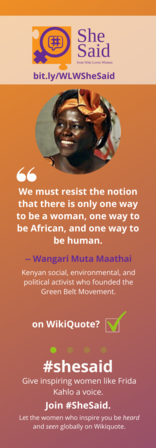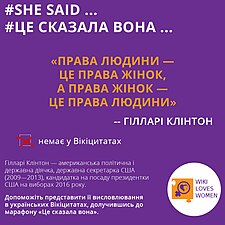Wiki Loves Women/Portal

Wiki Loves Women in brief
[edit]The project
[edit]Wiki Loves Women focuses on bridging two significant gaps on Wikimedia projects – women and Africa – both in terms of content about these subjects and in terms of participation by people from these groups. Wiki Loves Women is a Wiki in Africa project.
The project is designed to leverage Wikipedia’s role as a global repository for the dissemination of information to achieve accessible and fair online representation of notable women in countries in Africa. It encourages the contribution of existing researched and verified information by civil society organisations to Wikipedia with the intent of redressing the systemic bias online about women. The donated data and content specifically focuses on women’s contribution to the political, economic, scientific, cultural and heritage landscape, as well as the current socio-political status of women in each country that it is instigated.
In 2020, Wiki Loves Women announced its Advisory Committee that is made up of amazing women and men within the Wikimedia movement who have experience with pushing for gender equity. Many of the members were involved as their community's leads when doing Wiki Loves Women's activities in their countries. We are fortunate and honoured to have them involved.
The project achieves its aims by working with existing gender equality-focused civil society organisations to release their intelligence onto Wikipedia, and by training established Women’s groups and working with existing Wikipedia Volunteer groups to disseminate this information among the Wikimedia projects. In addition, the project encourages the activation and support of new and existing editors (both female and gender-sensitised male Wikipedians) in the focus countries.
Context
[edit]Gender inequality is rife across Africa. Although much progress has been made to address these inequalities in the workplace and within society, there remains a systemic bias towards profiling women, especially with regards to information, news and knowledge sources, both online and offline.
There are significant numbers of notable women who have shaped the past of African societies, there are innovative African female businesswomen who help to drive Africa’s many economies (formal and informal) and there are everyday realities that women and female children must face due to their gender. These stories need to sit alongside the ones of their male counterparts. Very few of these subjects can be found online, far fewer on the world’s largest knowledge repositories, such as Wikipedia.
Why Wiki Loves Women?
[edit]In ITU’s 2019 report 3.9 billion people (47% of the global population) are online. This means that 3.8 billion people are not connected to the Internet, despite 96% of the global population living within reach of a mobile signal. The majority of these unconnected people live in the least Developed Countries, where 80% of the population is offline. In 2019 Africa’s internet penetration was at 39.3 % (the world’s lowest). In 2020, Internet penetration across southern Africa is at 26.4%.
Internet access for women lags behind men. Overall, 48% of all women use the Internet, compared with 58% of all men. In Africa, the internet penetration rate drops to 33.8% for men and 22.6% for women. The digital gender gap has been widening over recent years. Other research finds that urban poor women are 50% less likely to use the internet than men. Analysis of these statistics mentioned above indicate the following barriers to Internet use:
- Affordability
- A lack of digital skills
- A lack of meaningful and interesting content (subjects that women are interested in or relate to, e.g. local issues, health,)
- A lack of content that represents their experience (e.g. expert women as thought leaders, stereotypical portrayal, etc.)
- A lack of cultural considerations (local context, stories and languages).
Lack of access to information by women becomes a self-perpetuating cycle. If women do not see themselves represented online with stories that are in their language and relevant to their culture, they are less likely to see themselves as capable of contributing. Further, without inspiring women being showcased on local media, many women will not be inspired to follow similar pathways. Leaving nobody behind is a central precept of the United Nations Sustainable Development Goals (SDGs).
Project links
[edit]
- Website:www.wikiloveswomen.org
- Inspiring Open Podcastːpodcast.wikiloveswomen.org
- Twitter:@Wikiloveswomen
- Instagram: @WikiLovesWomen
- Facebook page: @WikiLovesWomen
- Facebook groupː Mind The Gender Gap group
- Telegram Groupː WikiGenderGap
- On Wiki in Africa website: www.wikiafrica.net/wiki-loves-women
The spin-off Wiki Loves Women Asia
[edit]Our work in Africa inspired our friends and allies in Asia, and they start Wiki Loves Women Asia, a project that focuses on bridging the gender gap in Wikipedia and creating content on women keeping the context of feminism and women in Asia and release and make widely available cultural and educational content on, or related to women, to the general public. Keep in touch with them at Wiki Loves Women Asia.
WLW Activities in 2024
[edit] Done March: ISA global campaign – Tell Us About Her : Women in Art. Ends: March 31
Done March: ISA global campaign – Tell Us About Her : Women in Art. Ends: March 31 Done March: Support for and involvement in the Celebrate Women global Celebrate Women focus
Done March: Support for and involvement in the Celebrate Women global Celebrate Women focus Doing...: WLW Focus Group: 28 women from 12 African countries activate their communities
Doing...: WLW Focus Group: 28 women from 12 African countries activate their communities Doing...:Sept-Dec: 2024 SheSaid global campaign: the annual campaign on Wikiquote
Doing...:Sept-Dec: 2024 SheSaid global campaign: the annual campaign on Wikiquote
Additional elements done during the year
See all the activities of the previous years from here.
Wiki Loves Women Brand/Communications elements
[edit]Logos
[edit]
Logos: Wiki Loves Women family
[edit]-
WLW SheSaid logo
-
Wiki Loves Women Focus Group logo
-
Inspiring Open Podcast logo
-
Wiki Loves Women Tell Us About Her logo
Additional logos for other regions and international drives can be found here
Wiki Loves Women colours
[edit]#642882
R102, G45, B145
C75, M1, Y98, K0
Pantone P 93-B U
#ff9600
R247, G148, B30
C0, M49, Y98, K0
Pantone P 20-8 U
Secondary Colours
#507dc8 – Tell Us About Her
#96c51d – Inspiring Open
#ffc800 – SheSaid & Tell Us About Her
##ff3c82 – SheSaid & Focus Group
There are generic communications materials and how the brand has been implemented can be found Wiki Loves Women Communications category on Commons.
SheSaid campaign bookmarks, postcards and social media visuals
[edit]Bookmarks
[edit]-
2021
-
2022
-
2023
-
2023
-
2024
-
2024
Postcards
[edit]-
2020
-
2021
-
2022
-
2023
-
2024
Social media
[edit]-
2020
-
2020
-
2022
-
2022
-
2023
-
2023
-
2024
-
2024
For help and access to templates on Canvas, please get in touch with Afek
Link to the categories:SheSaid bookmarks, SheSaid Visuals and SheSaid postcards.
Other links and resources
[edit]
- Mind The (African and Gender) Gaps (written by Anthere, for the Wiki Loves Women website)
- Wiki Loves Women ToolKit Event
- WLW Resources
- Gender, Diversity and Inclusion submissions Wikimania 2021
























